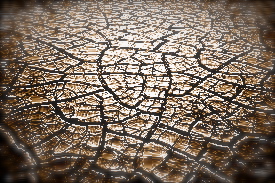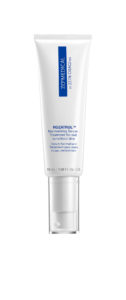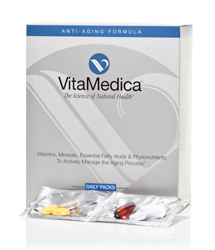Dry skin results from the loss of lipids (oils) and water in the outermost layer of skin. This barrier layer is largely made up of lipids. These lipids regulate the water content of the skin so as lipids diminish in the skin, water loss increases, eventually resulting in dry skin.
Healthy structure and function of the outer barrier layer requires a water concentration of 10-20%. When water loss occurs, cell volume decreases and skin cells curl upward, shrink, and become scaly. As cells become increasingly inelastic, fissures or cracks occur, which further compromises the skin. This can lead to inflammation and the entry of agents that can produce an allergic or irritant reaction. In this condition, exposure of your skin to additional irritants will cause further damage and lead to increased dryness.
Here are some things to consider in your efforts to maintain adequate oil and water in the outer skin layer:
Skin pH
The normal pH of the skin is 5-6. Higher pH levels, such as those found in most bar soaps, damage the skin by harming proteins. You should use creamier cleansers instead of soaps and pH adjusted oils and moisturizers for added hydration.
Evaporation
Shower or bathe with lukewarm water, as it does not allow water to evaporate from the skin barrier as quickly as hot water. After bathing, towel dry and, while still damp, apply an oil or moisturizer to replenish the oil lost in your skin.
Body Products
Products that use de-greasing agents, fragrances, preservatives, dyes, etc., which remove oil, as well as rough scrubs that further deplete sebum, should be avoided. Body products that are made to enhance oil-retention should be used instead. Fatty acids found in virgin coconut oil have the added benefit that they are native to skin so they replace lost lipids. It is important to use a regimen that is consistent. At a minimum, use a hydrating cream cleanser for the face and an intensive moisturizer. A non-drying, anti-aging toner may be added if your skin is not already very dry.
Medical Conditions, Diet, & Sun Exposure
It is also important to consider whether your health status is contributing to your dry skin. Diabetics or those who take medications such as diuretics are more likely to have really dry skin especially if the medications used are not well controlled. A poor diet, sudden weight loss, or inadequate nutrition can make the skin extra dry. The production of less oil in the skin of the elderly often leads to chronic dryness. Extended periods of unprotected sun exposure will lead to sunburns which adds to water loss and will initiate or worsen dry skin. Allergens and irritants in your makeup, skin care, and hair care products and even in your clothing can be intensified when your skin is dry.
In the next blog, skin care products that we recommend for dry skin will be discussed.
Tags: Facial Aging, Skin Care, wrinkles
Written by Dr. Forley on September 26, 2018





